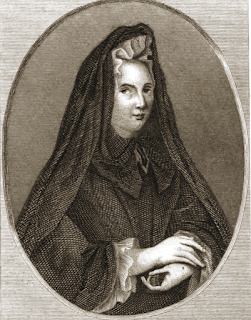 Reflections on
Reflections on
the Life of
Madame Jeanne de la Mothe Guyon.
Her poetical writings. Justice of God amiable.
It is about this time that we find the first mention of her attempts at poetry. Poetry is the natural expression of strong feeling. She felt, and she wrote. It is possible that she had made attempts of this kind before; but I find nothing said of it. Voltaire, who goes out of his appropriate sphere of judgment in discrediting her religious pretensions, speaks lightly also of her effusions in verse. It would require a more intimate knowledge of French poetical diction than I profess to have, to give an opinion of her poetry, so far as the expression is concerned. But I do not hesitate to say, with great confidence, that this portion of her writings, with some variations; undoubtedly, exhibits in a high degree the spirit of poetry. There is thought in it; there is feeling. The highest kind of thought, the deepest feeling. The following poem, translated by Mr. Cowper, whom some critics, I think, would not place below Voltaire, either as a writer or judge of poetry, may be regarded as expressive, in some particulars, of her religious experience at this time ; and is probably to be referred, in its origin, to this period of her life. It indicates a deep sense of her unworthiness, and a humble and approving resignation to God's will, under the heaviest inflictions of His providence.
DIVINE JUSTICE AMIABLE.
THOU hast no lightnings, O thou Just!
Or I their force should know;
And, if thou strike me into dust,
My soul approves the blow.
The heart, that values less its ease,
Than it adores thy ways,
In thine avenging anger sees
A subject of its praise.
Pleased I could lie, concealed and lost,
In shades of central night ;
Not to avoid thy wrath, thou knowest,
But lest I grieve thy sight.
Smite me, O thou, whom I provoke!
And I will love thee still.
The well deserved and righteous stroke
Shall please me, though it kill.
Am I not worthy to sustain
The worst thou canst devise?
And dare I seek thy throne again,
And meet thy sacred eyes?
Far from afflicting, thou art kind;
And in my saddest hours,
An unction of thy grace I find.
Pervading all my powers.
Alas I Thou sparest me yet again ;
And when thy wrath should move
Too gentle to endure my pain
Thou sooth'st me with thy love.
I have no punishment to fear ;
But, ah! that smile from thee
Imparts a pang far more severe
Than woe itself would be.
— from The Life of Madame Guyon (1877), Volume 1, Chapter 10.

No comments:
Post a Comment